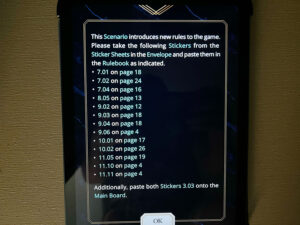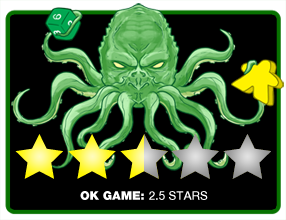 I have a love/not-enjoy relationship with legacy games. I love the idea of them, but generally end up not enjoying them as much as I thought I would. I have played Pandemic Season 1, Charterstone, My City, Betrayal Legacy, Aeon’s End Legacy, and Jurassic World: the Legacy of Isla Nublar. Almost every game followed the same trend—excitement at the start of the campaign, love of roughly the first three games, loss of momentum after that, taking a break, trying to return and relearn all of the rules, giving up and moving on to the next hotness.
I have a love/not-enjoy relationship with legacy games. I love the idea of them, but generally end up not enjoying them as much as I thought I would. I have played Pandemic Season 1, Charterstone, My City, Betrayal Legacy, Aeon’s End Legacy, and Jurassic World: the Legacy of Isla Nublar. Almost every game followed the same trend—excitement at the start of the campaign, love of roughly the first three games, loss of momentum after that, taking a break, trying to return and relearn all of the rules, giving up and moving on to the next hotness.
Then I played Ticket to Ride Legacy: Legends of the West. The game was a modern spin on a proven design, easy to play, and enjoyable. We actually completed the campaign. My desire to play legacy games was rekindled!
Then I heard about Divinus. It looked like a tile-laying game similar to Carcassone, but with a dice selection mechanism. It was also a legacy game. Given my recent success with Ticket to Ride, I had to play it.
So, did Divinus extend my enjoyable legacy streak to two in a row, or was I mistaken to play another legacy game so quickly?
NOTE: This will be a spoiler-free review.
Gameplay Overview:
Divinus is an app-driven competitive tile-laying, dice-rolling legacy game for two to four players. Like most legacy games, new rules are added both during and/or after each scenario, as well as modifying game components with stickers. Scenarios start off lasting between 45 and 60 minutes, but playtime increase as you progress deeper into the campaign, due to additional rules and mechanisms.
The number of rounds are variable. The turn structure during a round for each player is as follows:
- Must perform a Main Action
- Explore – allocate your dice to claim a map tile
- Rest – Reclaim your dice from the board and reroll them
- May perform your Demigod action
- These become available in the second scenario (not a spoiler – this is stated in the rulebook)
Each scenario ends when your tableau matches the required size, typically a 4 x 4 grid, or when all players take the Rest action twice in a row. The app will then tabulate scores for the round (with your input), as well as hand out end-game rewards, if applicable. The winner will be the player with the most favor after 12 games will be crowned Divinus (a new god)!

Game Experience:
What made me want to embrace the Greek or Norse gods:
The core gameplay loop is fun. There are twelve slots on the board, appropriately numbered one through twelve. You will have a number of dice that you roll (more at lower player counts). You will then use those dice to claim a tile by adding or subtracting their values to get to your target number. Want to get the #5 tile. You could use a 5, or three 1’s and a 2, or even a 6 and a 1. Of course, the more dice you utilize, the less you can use for future turns, potentially forcing you to rest before you want to.
Claiming the tile is only half of your job. The other is creating a map that impresses the gods. Tiles can have up to three terrain types: mountains, plains, and seas. To start, they will also either have sacred places or faction icons. Your job is to create a map that scores the most favor (having the most or biggest area for the terrain types) and/or completes quests before your opponents, earning you favor and rewards. The balance of trying to best complete your map while making sure your opponents do not acquire their needed tiles, while efficiently using your dice, was very entertaining for me.

While I had problems with the app (see below), it does a great job running the game for you. First, it asks “Are you certain you want to proceed?” before moving on to the next step, forcing you to say yes. While it sounds annoying, it has saved me SEVERAL times from making a mistake. Also, there is a one-second delay on any button that will move the game forward so that you do not accidentally double-tap and skip a screen. There is a glossary that defines scoring conditions for the different scoring opportunities. This feature made looking up rules much easier. It handles all other game management such as narrative events, scoring, majorities, scannable locations, and all other behind-the-scenes calculations needed to run the game more smoothly. It even reminds you of what goes where when you are cleaning up and setting up. The app was well thought out and I truly think it made the game better.
What made me want to go back to Ticket to Ride Legacy:
My biggest issue with the Divinus is the lack of support for the game. It is an app-driven game. If you go online, you will find several unanswered questions. Worse, players have had bugs with the app. I lost a save file once. The app also crashed several times (luckily, the way the game saves, no information was lost either time). Players have been promised a FAQ since March. I could not find one online. Can you remove a player from a game? Can you add a player to the game? With no response, and because I could not figure out a way, I assume the answer to both is no. This is not good for a legacy game with 12 games before it is complete. Players need to have ways to adjust participants if real life gets in the way. I do not mind having apps integrated into my games, but issues like this just fuel the fire for the anti-app crowd.

Another issue I had was with the unlocks. Most legacy games have unlocks at the end of the game, or minor unlocks midgame. Divinus hits you with unlocks throughout the scenario. This SOUNDS great, but it is not. End of the scenario unlocks are fine. You expect rewards from accomplishments made through gameplay. It’s the start of the scenario unlocks that surprised me the most. You have just completed a game and everyone decides they have time for one more. Why not? You have the components out, how long will starting a new game take?
Suddenly, instead of getting into the game, everyone is trying to learn a whole bunch of new rules. Every scenario is not as bad as the one pictured, but everyone I played with was frustrated at learning the new rules at the start. It is the unknown of how complicated the game will be. Had they been at the end of the scenario, we would have known the time commitment needed for the next game. In addition, some of the midgame unlocks slow the game down. Some are simple, but a couple were not and required reading, explaining and some questions before starting the game up again.

There are a lot of stickers. They are a staple of legacy games, as they are an efficient way to edit components without having to write on them or create brand new components. Some go on tiles. Some go in the rulebook. Some go on the dice. Others are removed. You better like stickers. Oh, and do not get frustrated with them if they don’t stick perfectly. Unfortunately, my stickers had a hard time sticking on my dice. The app told me to put them back on the sticker sheet and wait a few minutes. Unfortunately, the stickers had been on my dice for several games, so those empty slots had been exposed for days and could not magically recharge my stickers.
Finally, I was not engrossed with the story. On paper, this game should have clicked for me. Trying to work with two warring Mythological factions, steeped with lore, sounds amazing. It just did not work that way with the game. I will not spoil anything. Decisions just did not have the umph I wanted them to have. There are some things that happen that are interesting, do not get me wrong. It is just that the overall narrative was not as powerful as I hoped it would have been.
Final Thoughts:
Unfortunately, Divinus just did not work for me. I think there is a good game there. In fact, my misses are not gameplay related. The game needed more development. The unlocks needed to be better managed. Some of the unlocks are not as impactful as they seem. But the biggest issue is the support of the game. I would recommend this game if the theme interests you (a legacy game using tile laying to compete for the favor of Greek and Norse gods). But I would recommend you follow the game to see if some of the issues are addressed.
Final Score: 2.5 Stars – A passable legacy game that did not work for me.
 Hits:
Hits:
• Acquiring tiles and building your map
• App is great for organizing the game
Misses:
• Support for the game
• Unlocks can slow the game down
• Stickers
• Story not engrossing





















